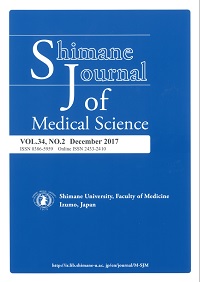Shimane University Faculty of Medicine
ISSN :0386-5959(冊子体)
ISSN :2433-2410(オンライン)


これらの論文は クリエイティブ・コモンズ 表示 - 非営利 - 改変禁止 4.0 国際 ライセンスの下に提供されています。
ダウンロード数 : ? 件
この文献の参照には次のURLをご利用ください : https://ir.lib.shimane-u.ac.jp/8134
Shimane Journal of Medical Science 29 1
2012-12-01 発行
Interactions Between ACE Deletion Allele and Obesity During Intervention With Lifestyle Modification in Mild Obese Japanese
ファイル
内容記述(抄録等)
As the gene-gene or gene-environment interactions on obesity are unresolved, we investigated the ACE I/D, UCP1 -3826 A/G, α_(2B)-ADR Glu^(12)/Glu^9, β_3-ADR Trp64Arg, and PON1 Q192R genotypes at the baseline and after a lifestyle-modified intervention for body mass index(BMI). A total of 212 Japanese adults lowered their BMI 0.8 ± 0.8kg/ m^2 over three months. The I/D + D/D genotypes of ACE had significantly higher BMI compared to the I/I genotype at the baseline, but there were no significant differences for the other four genetic polymorphisms and the addictive effects of these genetic polymorphisms. The I/D + D/D genotypes of ACE induced greater reduction of BMI. Greater weight-loss in the D allele group remained after adjustment for age, sex, BMI at the baseline, energy balance and the other four genetic polymorphisms. The I/D + D/D genotypes of ACE had significantly higher BMI at the baseline, but induced weight-loss through the lifestyle intervention, as compared to the I/I genotype.
About This Article
Other Article
PP. 23 - 30
